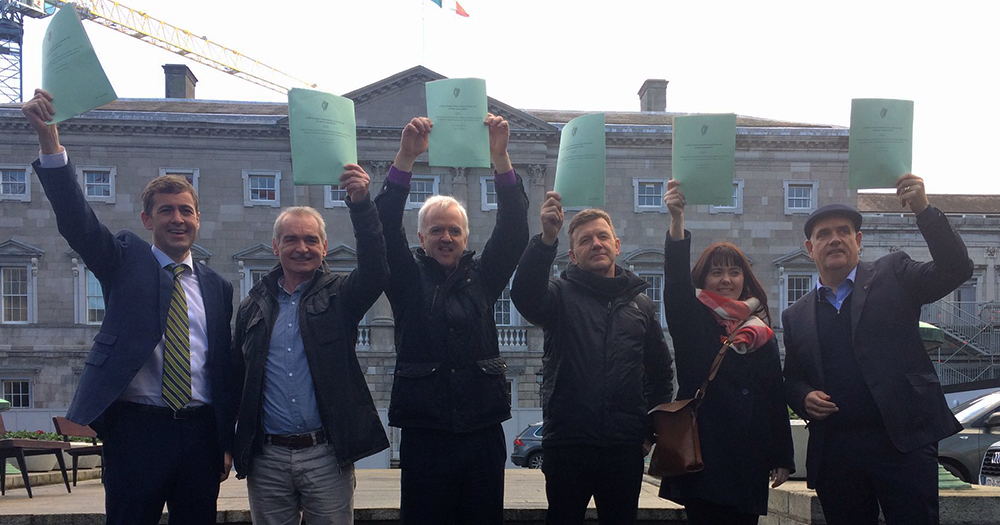Last week, the Irish Sign Language for the Deaf Community Bill 2016 passed all stages in the Dáil.
BREAKING: Joyous scenes in #Dail as the Recognition of Irish Sign Language for the Deaf Community Bill passes @IrishDeafSoc @rtenews pic.twitter.com/ssEg0ApSf3
— Conor McMorrow (@ConorMcMorrow) December 14, 2017
There were jubilations in the public gallery where members of the deaf community overlooked proceedings.
Sign language is used by approximately 5,000 members of the deaf community and countless others to communicate with them.
We spoke to Greenbow, an organisation run for the benefit of the Deaf LGBT+ community all over Ireland, who told us what the significance of this historic bill means to them.
What’s in the Bill?
The Bill contains a number of important sections that will make a difference to the lives of Deaf people into the future. These include:
- Recognition of Irish Sign Language: recognising the Right of a Deaf person to use ISL and placing a duty on public bodies to provide free interpretation.
- Use of ISL in legal proceedings: allowing a person to use ISL in any pleading in court and to have an interpretation in ISL.
- Educational supports for deaf children: Requiring the Minister for Education and Skills to provide ISL classes to parents, siblings and grandparents of deaf children, and to ensure that there are sufficient placements in higher education offering training in ISL to teachers of children who are Deaf or Hard of Hearing.
- The duty of public bodies: Public bodies must do ‘all that is reasonable’ to ensure that ISL interpretation is available on request to Deaf people when they are accessing public services.
- Engagement of verified competent ISL interpreters: Public bodies must only use qualified ISL interpreters, and the Sign Language Interpreting Service (SLIS) will be setting up an accreditation framework in the near future.
- Support for access to events, services and activities for users of ISL: this is a vital section of the Bill, as it recognises that Deaf citizens are not just disadvantaged in accessing public services, but also in accessing personal, social and cultural services.
“Two important points to note about this section: public bodies include anybody, organisation or group wholly or partly funded by public monies; and ‘all that is reasonable’ is only used in the context that on some occasions an interpreter may not be available at a particular time or place, due to the shortage of interpreters at present. In other words, lack of funding is not a valid legal excuse in the future!”
This is the first time the State has recognised this disadvantage that Deaf people face on a regular basis. The bill means that a scheme will be set up by the Minister for Employment Affairs and Social Protection to provide Deaf people with interpretation in social, educational and cultural events, including for example when a Deaf person who does not have a medical card has a GP appointment. It is expected that guidelines for a scheme will be drawn up in mid-2018, and funding has been provided to establish a pilot scheme later in 2018.
This scheme has the potential to give Deaf people meaningful equality with their hearing peers into the future… providing it is funded and resourced properly.
Joyous Occasion
https://www.facebook.com/GBWDeafLGBT/photos/rpp.442046662563577/1206828832752019/?type=3&theater
Two members of the Greenbow committee, Julianne Gillen and Kris Daly, were in the Dáil gallery and witnessed the emotional and exhilarating moment when the ISL Bill passed all stages in the Dáil.
“The screams and celebratory shouts from the Deaf people in the Gallery lifted the roof off Leinster House! Thankfully the Cean Commhairle forgave us for our undignified behaviour – the Deaf community has campaigned for over 30 years to get this recognition”
“This is a monumental change for the Deaf community, not only does the upcoming Bill offer legal recognition for Irish Sign Language (ISL) as an official language – it allows ISL users the right to request access to all public services, courts and education via ISL”
“It also recognises the role of having a national register of ISL Interpreters too. No more relying on goodwill or Equality Acts to access public services; service providers that cite ‘Nominal Cost’ as an excuse or offer a ”staff member who did 10 ISL lessons at level 1” will now be expected to provide full ISL access when requested.”
There was a formal undertaking from the Minister of State, with responsibility for disabilities, of additional funding to ensure some access to private services will also be covered under a pilot project.
The Importance of the Bill for the Deaf LGBT+ Community
Any LGBT+ services that are publicly funded will now have to provide access via ISL on request too; we encourage all LGBT+ services prepare now for this Act and have a service plan in place, for when it is legally implemented.
“Greenbow Deaf LGBT group will continue to educate on, support and advocate for, access for all our Deaf and Hard of Hearing members. We continue to offer free advice to any LGBT+ services looking to improve access to Deaf and Hard of Hearing clients.”
President Michael D Higgins is expected to sign the bill into effect over the coming days.
© 2017 GCN (Gay Community News). All rights reserved.
Support GCN
GCN is a free, vital resource for Ireland’s LGBTQ+ community since 1988.
GCN is a trading name of National LGBT Federation CLG, a registered charity - Charity Number: 20034580.
GCN relies on the generous support of the community and allies to sustain the crucial work that we do. Producing GCN is costly, and, in an industry which has been hugely impacted by rising costs, we need your support to help sustain and grow this vital resource.
Supporting GCN for as little as €1.99 per month will help us continue our work as Ireland’s free, independent LGBTQ+ media.
